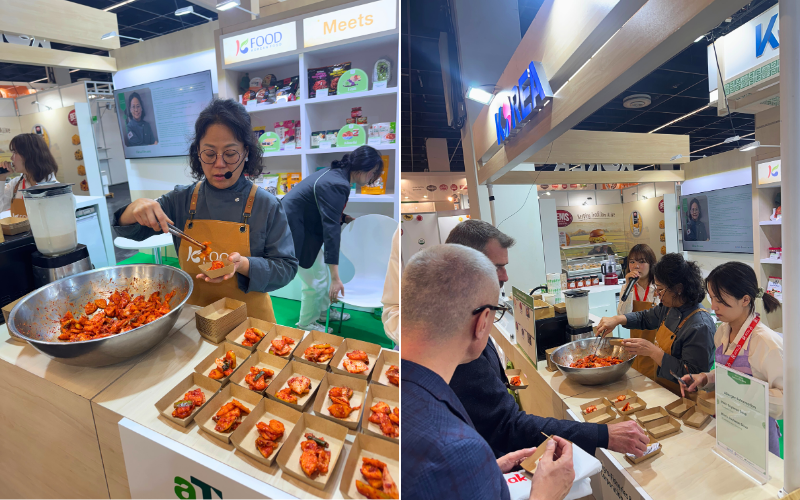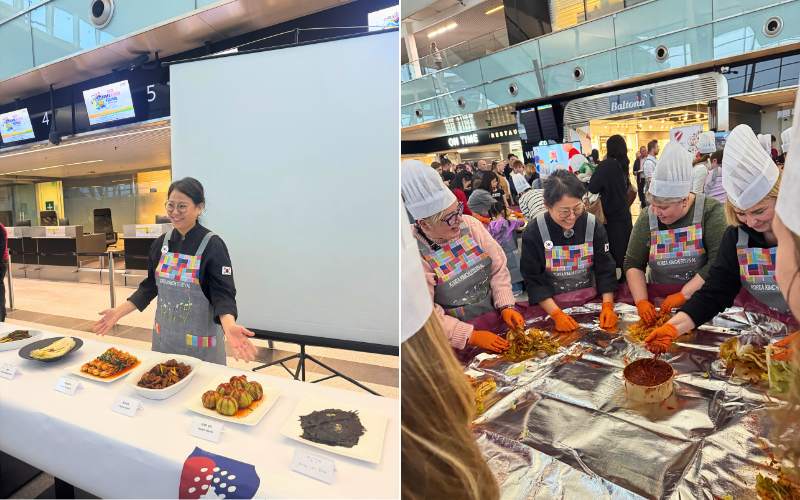[INTERVIEW] Chef Hera Hwang discusses K-Food highlights at Anuga and the Kimchi Festival 2025
2025-11-22Hera Hwang is a Korean-born chef and culinary researcher based in Berlin, where she serves as the owner and head chef of the restaurant PUM Korean Restaurant. She completed formal training in Korean traditional cuisine at a research institute in Korea and earned certification as a Korean Traditional Food Specialist. Her background also includes studies in fermentation, food preservation, and the Vegetable Sommelier program.
Before moving to Germany, Hwang operated a Korean restaurant and cooking studio in Korea, where she taught cooking classes and worked as a culinary researcher. Since relocating to Berlin in late 2017, she has continued her career as a chef, bringing her expertise in Korean cuisine to an international audience.
During Anuga 2025 (4-8 Oct), the bi-annual food and beverage mega-fair in Cologne, Germany, Chef Hera Hwang introduced visitors to a curated range of traditional Korean foods. Her presentation highlighted the sophistication, culinary techniques, and cultural heritage that define Korean cuisine, drawing strong interest from the international audience. After Anuga 2025, Hwang served as an ambassador at the Kimchi Festival 2025, on Nov 15, at Wrocław Copernicus Airport in Poland, where she shared her extensive expertise in fermentation and traditional Korean cuisine. Through hands-on workshops and tastings, she helped introduce the rich world of kimchi to an even broader European audience.
The following are excerpts from an email interview with her on Nov 12-21, where she talks about Anuga 2025, the Kimchi Festival 2025, and the way she introduces Korean food and culture through her work.
1. How would you describe your approach to Korean food?
To me, Korean cuisine is about honesty in flavor. I base my cooking on traditional Korean sensibilities, while interpreting them through the lens of the city I live in and the cultural experiences of the guests I serve. Korean food values the intrinsic character of each ingredient through elements such as fermentation, broth, and the balance of seasoning. That’s why I focus on respecting local ingredients and bringing out their most natural flavors. My approach is to preserve the essence of tradition while finding expressions that feel authentic and approachable to people from different cultures.

2. Could you tell us about your involvement in Anuga 2025?
In 2025, Anuga marked its largest edition in history, and Korea was invited as the main guest country for the first time. Consequently, the Korean government set up an unprecedentedly large pavilion to promote Korea’s diverse ingredients. I was contacted by the advertising and PR agency in charge of organizing and operating the Korean Government Pavilion, and I decided to participate, believing it would be a great opportunity to contribute to promoting Korean cuisine.
3. What Korean foods were featured at Anuga 2025? Why?
The Ministry of Agriculture, Food and Rural Affairs of Korea requested menu suggestions using Korean ingredients such as seaweed (kim), soy-based beverages, pears, tuna, etc., to expand exports and overseas market distribution.
In response, I presented rice balls made with seaweed and tuna topped with crispy seaweed snacks, and a chilled soy-based noodle dish with added tofu, inspired by Korea’s popular summer dish, kongguksu (cold soybean noodle soup). Additionally, I created a Korean-style autumn fruit kimchi using Korean pears combined with persimmons purchased in Germany.
4. What has the response been like to K-Foods at Anuga 2025?
Anuga 2025 was held on an unprecedented scale, with Korea as the guest country of honor, attracting great attention from people and media outlets around the world. In particular, with the recent global popularity of K-pop, K-culture, and K-beauty, the interest in K-food has also grown immensely. Many visitors lined up to taste the promotional dishes I created, and their reactions were enthusiastic and highly positive. It was a moment that filled me with pride

5. The Kimchi Festival 2025 seems poised to highlight the diversity of kimchi types. Could you share what kinds of regional or modern variations might surprise international audiences?
First of all, I am honored to have been selected as the official ambassador for the 2025 Korean Kimchi Festival. As you predicted, I prepared and exhibited 11 different kinds of kimchi at this year’s Poland Kimchi Festival. Among them, I recreated several royal court kimchi recipes from the Joseon Dynasty, and I also developed new kimchi using vegetables favored by Europeans as well as vegetables preferred by Asians living in Europe.
In particular, I created a potato kimchi using potatoes, which are one of the most consumed and beloved ingredients in Poland. Its flavor and creativity received great admiration from the local audience. I also presented other innovative varieties, including olive kimchi made with fermented garlic to remove its sharpness, baby bok choy kimchi, tomato kimchi, coriander (cilantro) kimchi, and more.
Three years ago, during an event hosted by the Korean Embassy in Germany, I introduced cauliflower kimchi, which received overwhelming praise from the guests. On that occasion, the Korean Ambassador personally complimented me on the creativity of the dish.
6. How do you teach people about Korean food and culture through your work?
I have been running a Korean restaurant called PUM in Berlin for five years. I’ve heard that there are around 100 Korean restaurants of various sizes in the city. Unfortunately, most places offer very similar menus, and it is difficult to find true authenticity and traditional flavors.
To introduce the diversity of Korean cuisine and its genuine taste, I focus on serving unique and traditional dishes that are different from other Korean restaurants. (For example: soy-marinated crab, spicy marinated crab, pork bone stew, hangover soup with ox blood, loach stew, braised monkfish, Pyongyang cold noodles, cold soybean noodles, temple vegan dishes, etc.)
At PUM, almost all of our dishes are prepared and served in the most traditional way possible, from flavor and spice levels to ingredients and cooking methods. Our staff also acts as ambassadors of Korean food culture, doing their best to explain the origins, history, and background of the dishes to our guests. This is my small way of promoting Korean cuisine in everyday life.
7. What inspires you most as a Korean chef working in Berlin?
As Berlin is undoubtedly one of the world’s truly international cities, people of diverse nationalities and ethnicities coexist here. I draw a great deal of inspiration from the ingredients and cooking methods preferred by different cultures, and I continuously research and strive to incorporate these influences into Korean cuisine.
8. What are your goals and future plans?
Not only in Germany, but more and more guests are coming from neighboring countries to taste my food. I want to introduce them to the deep and rich flavors of Korean cuisine. Moving forward, I hope to continue developing new dishes through research and experience with local ingredients and to serve as a culinary ambassador, connecting with customers through food. I also aspire to contribute to nurturing the next generation of Korean chefs as I continue to grow.
Hera Hwang bridges cultures and introduces audiences to the richness of Korea’s food traditions. Her work, both in the kitchen and at international events, reflects a commitment not only to craftsmanship but also to cultural exchange, making her an influential figure in the global promotion of Korean cuisine.
How about this article?
- Like5
- Support2
- Amazing5
- Sad0
- Curious0
- Insightful0


